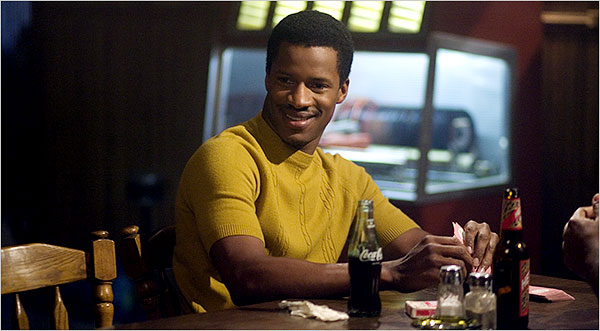|
Reviews of Recent Independent, Foreign, & Documentary Films in Theaters and DVD/Home Video

BLOOD DONE SIGN MY NAME Blood Done Sign My Name is a well-meaning film—a story of the civil rights movement; of Jim Crow and a gamed justice system; of the pettiness of daily racism and its periodic, violent eruptions. These themes cannot help but get the audience’s attention. However, the film’s well-intentioned nature is the problem with Blood. It’s so effective at automatically generating goodwill that a number of crucial elements are ignored or lay underdeveloped, as if the filmmakers were dazzled by the themes and couldn’t get past the haze of empathy. The storyline itself is scattershot. In 1970, Reverend Vernon Tyson (Ricky Schroder) and his family move to Oxford, North Carolina, a small town late to the civil rights game. At the same time, Ben Chavis (Nate Parker) moves back to teach at the all-black school after spending some time working in the civil rights movement. Ostensibly the story is about these two men and the ways they change and change the town, but the film is so cluttered that neither receives enough attention. Chavis spends most of his screen time silent or curt, and thus his epiphanic transformation into a leader feels unearned. Tyson and his family disappear for a large part of the film, making a viewer wonder why so much time was invested in their characters in the first place. The larger problem, though, is twofold. On a technical level, writer/director Jeb Stuart (writer of Die Hard and The Fugitive) doesn’t trust the audience. Exposition is clunky, and lessons are heavy-handed. The morally corrupt are rarely outright villains; the virtuous rarely truly pure. Yet Blood takes the easy way out and paints everything in shorthand, partly out of necessity due to the sprawling plot, but partly out of Stuart’s mistrust of the audience. One of the lucky breaks of writing a film dealing with civil rights is that it almost naturally has a tenseness and an inherent narrative motion. Outrage is a powerful device to move the plot along because of the tension it creates. The audience cannot help but be invested. This was the greatest trick of Harry Potter and the Order of the Phoenix. Umbridge was so unfair to Harry Potter that the audience cannot wait to see her get her comeuppance. And that was story about wizards.
Blood’s
central plot point deals with the murder of a newly-returned black
veteran, who is executed by a nauseating bigot. This creates not only
outrage in the town, but in the viewer. Real, palpable outrage. But the
film cannot use that indignation and channel it because so much is going
on. Instead, that anger and frustration dissipates, not simply divorcing
the viewer from the film but causing the narrative itself to peter out.
Andrew Beckerman
|

